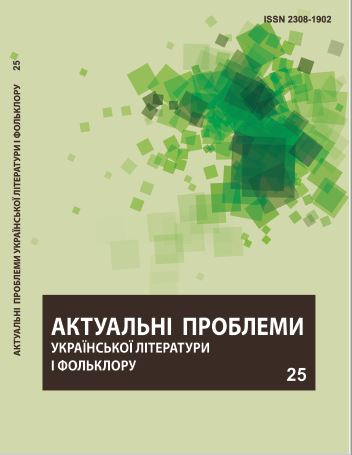Anti-utopia and heterotopia: fictional carceral city in story “The City Without Money” by Kuzma Skriabin.
DOI:
https://doi.org/10.31558/2308-1902.2017.25.11Keywords:
city, space, locus, topos, panopticon, anti-utopiaAbstract
The article represents an attempt of geopoetical view on post-Chornobyl story by famous Ukrainian poet and pop-singer A. Kuzmenko (a.k.a. Kuzma Skriabin). Analyzed text is the part of Ukrainian postcolonial and at the same time postmodern discourse, coined by T. Hundorova as “postChornobyl Library”. In the article based on ideas of U. Eco, M. Foucault and M. de Certeau an analysis of spatial frames and special narrative is being conducted. It is supposed that the topical parameters of the story could be interpreted in terms of “heterotopia” (“other space” which mixes cultural semantics, effectively excluded from the order of human space) and “anti-utopia”. The City, linked for sure with its prototype, Prypiat, is composed of heterotopias of lower level: railway station, cemetery, hotel, hospital and so on. The most powerful and valuable for plot spatial frames in the story are those with semantics of graveyard: depot of contaminated machines and empty rural house, which preserved signs of pre-evacuation life. It was proven that the transformation of Alisa, the heroine of the story, is marked with those catastrophic loci. The embodiment of power in the City was also traced. Transhumanistic experiments conducted in the City are interpreted as totalitarian practice: both idea of “panopticon” (M. Foucault) and inscribing of power in skin (M. de Certeau). The post-Soviet nature of totalitarianism is at the same time an effective deconstruction of the idea of total control: unilateral transparency, effectiveness of repression machine are doubted in organization of the City. The key communist utopical idea (exclusion of money) symbolically marks the failure of total idea.References
Гундорова Т. Післячорнобильська бібліотека. Український літературний постмодерн. Київ : Критика, 2005. 264 c.
Семенов С. Дискотека с манекенами. Expert.ua. URL: http://expert.ua/articles/14/0/1817/ (дата звернення: 18.11.2017).
Бондар-Терещенко І. “Побєда” Скрябіна і вапше. Vsiknygy.net. URL: https://vsiknygy.net.ua/shcho_pochytaty/review/947/ (дата звернення: 18.11.2017).
“Я, «Побєда» і Берлін” Кузьми Скрябіна. Livejournal.com. URL: http://leorina.livejournal.com/78457.html (дата звернення: 24.11.2017).
Саган Г. В. Особливості індивідуального стилю прозописьма Андрія Кузьменка (Кузьми Скрябіна). Вісник Луганського національного університету імені Тараса Шевченка. Філологічні науки. 2011. № 17 (228). С. 101–106.
Лауда Л. Кузьма видав аудіокнигу “Я, «Побєда» і Берлін”. Gazeta.ua. URL: http://gazeta.ua/index.php?id=220817 (дата звернення: 23.11.2017).
Кузьма Скрябін. Місто, в якому не ходять гроші. Я, “Побєда” і Берлін. Харків : Фоліо, 2006. С. 81–159.
Стусенко О. Апологія відсутності (про місто/село як бінарну опозицію). Litakcent.com. URL: http://litakcent.com/2008/04/14/oleksandr-stusenko-apolohija-vidsutnosti-promistoselo-jak-binarnu-opozyciju/ (дата звернення: 17.11.2017).
Цікавий С. Особливості художнього простору в літературі: деякі філософські та нейрофізіологічні аспекти. Наукові праці Кам’янець-Подільського національного університету імені Івана Огієнка: Філологічні науки. Випуск 45. Кам’янець-Подільський : Аксіома, 2017. С. 227–230.
Galbraith M. Deictic Shift Theory and the Poetics of Involvement in Narrative. Deixis in Narrative: A Cognitive Science Perspective / Ed. by Judith F. Duchan, Gail A. Bruder and Lynne E. Hewitt. Hillsdale, NJ : Lawrence Erlbaum, 1995. P. 19–59.
Ryan M.-L. Space. The living handbook of narratology / Hühn, Peter et al. (eds.) URL: http://www.lhn.unihamburg.de/article/space. (last accessed: 17.11.2017).
Soja E. Taking space personally. The spatial turn. Interdisciplinary perspectives / Ed. by Barney Warf and Santa Arias. London, New-York : Routledge, 2009. P. 11–35.
Rybicka E. Geopoetyka. Przestrzeń i mejsce we współczesnych teoriach i praktykach literackich. Kraków : UNIVERSYTAS, 2014. 474 s.
Foucault M. Of Other Spaces: Utopias and Heterotopias. Rethinking Architecture: A Reader in Cultural Theory / Ed. by Neil Leach. New York : Routledge. 1997. P. 330–336.
Michałowska T. Kochanowskiego poetyka przestrzeni : wizja horyzontalna. Pamiętnik Literacki : czasopismo kwartalne poświęcone historii i krytyce literatury polskiej. 1979. № 70/1. S. 3–30.
Eco U. Światy science fiction. Po drugiej stronie lustra i inne eseje : znak, reprezentacja, iluzja, obraz / Przeł. Joanna Wajs. Warszawa : Wydawnictwo W.A.B., 2012. S. 233– 241.
Maj K. Allotopie. Topografia swiatów fikcjonalnych. Kraków : UNIVERSITAS, 2015. 315 s.
Knight K. Real Places and Impossible Spaces: Foucault’s Heterotopia in the Fiction of James Joyce, Vladimir Nabokov, and W.G. Sebald : Thesis submitted for the qualification of Doctor of Philosophy. Norwich : University of East Anglia, 2014. 216 p.
Stikells L. Flow urbanism. The heterotopia of flows. Heterotopia and the City: Public space in postcivil society / Ed. by Michiel Dehaene and Lieven De Cauter. London; New York : Routledge, 2008. P. 247–257.
Фуко М. Надзирать и наказывать / Перевод: В. Наумов. Москва : Ad Marginem, 1999. 480 с.
Certeau de M. The Practice of Everyday Life. Berkeley : University of California Press, 1984. 229 p.

